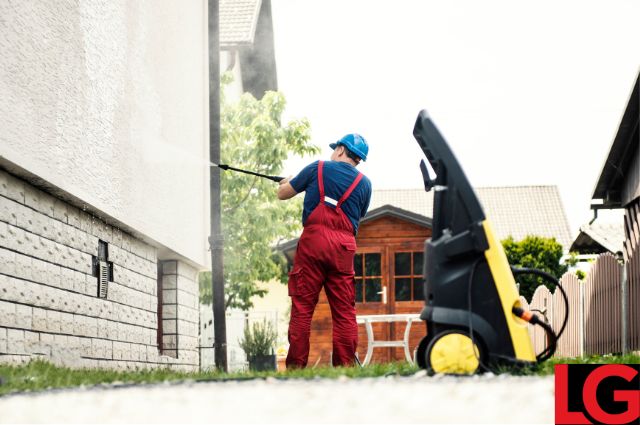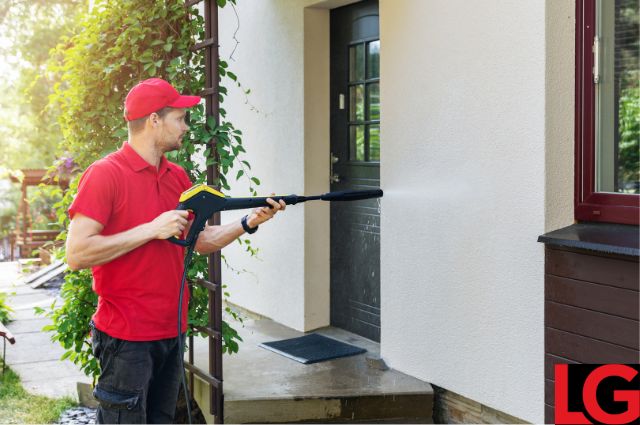Is your cleaning process truly as efficient as it could be? The best industrial high pressure cleaner can mean the difference between wasting hours on stubborn grime and effortlessly restoring surfaces to like-new condition. These industrial workhorses power through years of built-up dirt, grease, and debris—keeping factories, warehouses, and commercial spaces spotless. But with so many options available, choosing the perfect high pressure cleaner isn’t just about power—it’s about performance, efficiency, and long-term savings. Keep reading to discover how selecting the right machine can transform your cleaning operations and boost your bottom line.

Understanding the Basics: Power and Flow
When evaluating industrial high pressure cleaners, two key metrics stand out: PSI (Pounds per Square Inch) and GPM (Gallons Per Minute). PSI measures the force of the water output, while GPM shows the volume of water flowing through the machine.
High PSI is essential for blasting away stubborn dirt and grime. However, without adequate GPM, cleaning tasks can take much longer than necessary.
The ideal pressure washer strikes a balance between these two factors.
For example, a machine with 4000 PSI and 4 GPM may outperform one with 5000 PSI but only 2 GPM, depending on the specific cleaning requirements. The true measure of a pressure washer’s cleaning power comes from multiplying PSI by GPM.
This calculation gives you a more accurate picture of the machine’s overall cleaning efficiency.
When selecting a pressure washer, consider your typical cleaning scenarios. For removing caked-on mud from heavy equipment, you might prioritize higher PSI.
For quickly rinsing large surface areas, a higher GPM could be more useful.
Hot vs. Cold: Choosing Your Temperature
One of the most significant decisions in selecting an industrial pressure cleaner is whether to opt for a hot water or cold water system. Each has distinct advantages and drawbacks.
Hot Water Systems
Hot water pressure cleaners excel at breaking down grease, oil, and other stubborn substances. They’re particularly effective in:
- Industrial kitchens
- Automotive repair shops
- Heavy manufacturing environments
- Food processing plants
The heat helps to emulsify oils and fats, making them easier to wash away. This can significantly reduce cleaning time and improve overall results, especially in environments with heavy oil or grease build-up.
However, hot water systems come with higher upfront costs and more complex maintenance requirements. They typically have more components, including heating elements and fuel systems for heating the water.
This complexity can lead to higher repair costs and more frequent maintenance.
Hot water systems are also less energy-efficient than their cold water counterparts. The energy required to heat the water adds to operating costs over time.
Cold Water Systems
Cold water pressure cleaners are more versatile and generally enough for many cleaning tasks. They’re particularly well-suited for:
- General outdoor cleaning
- Removing loose dirt and debris
- Rinsing large surface areas
- Environments where chemical use is restricted
Cold water systems have lower upfront costs and simpler maintenance requirements. With fewer components, they’re often more reliable and have lower operating costs.
While less effective on grease and oil, cold water systems can still handle these substances when paired with suitable detergents. They’re also more energy-efficient, which can lead to significant savings on utility bills over time.
When deciding between hot and cold water systems, carefully consider your primary cleaning needs. If you’re dealing with heavy grease or oil on a regular basis, the investment in a hot water system often pays off in the long run through improved cleaning efficiency. For general cleaning tasks or environments where hot water isn’t necessary, a high-quality cold water system might be the more cost-effective choice.
Power Source: Electric, Gas, or Diesel?
The power source of your industrial pressure washer is another critical factor to consider. Each option has it’s own set of advantages and limitations.
Electric Pressure Washers
Electric pressure washers offer several unique benefits:
- Quiet operation: Ideal for noise-sensitive environments or indoor use.
- No emissions: Safe for enclosed spaces without ventilation concerns.
- Low maintenance: Fewer moving parts mean less frequent servicing.
- Instant start: No need to pull-start or warm up the engine.
However, electric models may lack the raw power of gas or diesel units. They also need access to an electrical outlet, which can limit mobility in some industrial settings.
Gas-Powered Pressure Washers
Gas-powered units are known for their:
- Portability: No need for electrical outlets, allowing use in remote locations.
- Higher power output: Generally more powerful than electric models.
- Quick refuelling: Easy to top up and continue working.
The downsides include noise pollution, emissions (making them unsuitable for indoor use), and more frequent maintenance because of the combustion engine.
Diesel-Powered Pressure Washers
Diesel-powered pressure washers are often the go-to choice for heavy-duty industrial applications. They offer:
- High power output: Typically the most powerful option available.
- Fuel efficiency: More economical for prolonged use compared to gas models.
- Durability: Built to withstand continuous, demanding use.
However, diesel units are usually the noisiest option and produce the highest emissions. They’re best suited for outdoor use or in well-ventilated areas.
When choosing a power source, consider your specific working environment, noise restrictions, and the availability of power sources at your cleaning sites. An electric model might be perfect for a food processing plant, while a diesel unit could be ideal for an outdoor construction site.
Durability and Build Quality
In industrial settings, high pressure cleaners face harsh conditions and constant use. Durability should be a top priority when selecting a machine.
Look for pressure washers with:
- Industrial-grade components: Commercial-quality parts designed for heavy use.
- Corrosion-resistant materials: Stainless steel, brass, or high-grade aluminium components.
- Robust pumps: The heart of the pressure washer, look for ceramic plungers and stainless steel valves.
- Sturdy frame: A solid frame protects internal components and improves stability.
- Quality hoses and fittings: High-pressure rated hoses with durable connections.
Pay special attention to the pump – it’s often the most expensive component to replace. A high-quality pump can significantly extend the life of your pressure washer and reduce downtime for repairs.
I once worked with a client who chose a cheaper, consumer-grade pressure washer for their factory floor cleaning. Within months, they faced frequent breakdowns and costly repairs.
The lesson?
Investing in quality upfront can save significant money and headaches down the line. When evaluating build quality, don’t just rely on specifications. If possible, inspect the machine in person. Look for solid construction, quality welds, and attention to detail in the assembly. These are often indicators of a well-built machine that will stand up to industrial use.

Safety Features and Ergonomics
Safety should never be compromised when it comes to high-pressure cleaning equipment. Modern industrial pressure washers come equipped with various safety mechanisms, including:
- Pressure relief valves: Prevent over-pressurization of the system.
- Thermal protection: Stops the motor if it overheats.
- Low-oil shutoff systems: Protects the engine from damage because of low oil levels.
- Ground fault circuit interrupters (GFCI): Protects against electrical shocks in electric models.
- Safety locks: Prevent accidental triggering of the spray gun.
Beyond preventing accidents, safety also encompasses operator comfort and fatigue reduction. Look for ergonomic features such as:
- Easy-to-use controls: Clearly labelled and easily accessible.
- Comfortable grip designs: Reduces hand fatigue during extended use.
- Well-balanced machines: Easier to manoeuvre and control.
- Adjustable handles: Allows operators of different heights to work comfortably.
- Wheel kits: Improves mobility, especially for heavier units.
Consider the weight distribution of the machine. A well-designed pressure washer distributes it’s weight evenly, making it easier to move around the work site.
This is particularly important for larger, more powerful units.
Some advanced models incorporate features like vibration reduction technology, which can significantly improve operator comfort during long cleaning sessions. While these features might come at a premium, they can lead to increased productivity and reduced operator fatigue.
Versatility and Attachments
The ability to tackle a variety of cleaning tasks with a single machine can greatly enhance your operational efficiency. Look for pressure washers that come with a range of nozzles and attachments.
Common attachments include:
- Surface cleaners: Ideal for large flat areas like parking lots or factory floors.
- Rotary nozzles: Combine the power of a pinpoint jet with the coverage of a wider spray.
- Extension wands: Allow for cleaning hard-to-reach areas or high surfaces.
- Foam cannons: Useful for applying thick layers of cleaning solution.
- Undercarriage cleaners: Specifically designed for cleaning vehicle undersides.
- Sand blasting attachments: For removing paint or rust from metal surfaces.
When evaluating attachments, consider the ease of switching between them. Quick-connect systems can save valuable time during cleaning operations.
Some pressure washers offer onboard storage for attachments, which can be a significant convenience in industrial settings. This keeps all necessary tools close at hand and reduces the risk of losing attachments.
Think about your specific cleaning needs, both current and potential future requirements. A versatile machine with the right attachments can adapt to changing cleaning demands without the need for extra equipment purchases.
Maintenance and Support
Even the best pressure washer will need regular maintenance to perform at it’s peak. When evaluating different models, consider the ease of maintenance and the availability of spare parts.
Look for machines with:
- Easily accessible components: Simplifies routine maintenance tasks like oil changes and filter replacements.
- Clear maintenance schedules: Detailed guidelines for regular servicing.
- Readily available spare parts: Ensures quick repairs and minimal downtime.
Warranty coverage is another crucial factor. Some manufacturers offer extended warranties or service contracts, which can provide peace of mind for critical industrial applications.
When reviewing warranties, pay attention to:
- Duration of coverage
- What’s included (parts, labour, etc.)
- Any exclusions or limitations
- How claims are processed
Equally important is the level of customer support offered by the manufacturer or dealer. Consider:
- Availability of technical support: Look for manufacturers with responsive customer service.
- Training options: Some companies offer operator training, which can improve efficiency and reduce the risk of equipment damage.
- On-site service options: For critical applications, the ability to get on-site repairs can be invaluable.
I always advise my clients to factor in the total cost of ownership, not just the initial purchase price. A machine with excellent support and easy maintenance might cost more upfront but save money in the long run through reduced downtime and repair costs.
Making the Final Decision
Choosing the right industrial high pressure cleaner needs careful consideration of many factors. Here are the key points to keep in mind:
- Balance PSI and GPM for optimal cleaning efficiency
- Consider hot water systems for heavy grease and oil removal
- Choose the power source that best fits your working environment
- Prioritize durability and build quality for long-term reliability
- Don’t overlook safety features and ergonomic design
- Look for versatility in attachments and applications
- Evaluate maintenance requirements and available support
Remember, the most expensive or powerful machine isn’t always the best choice. The ideal pressure washer is one that meets your specific cleaning needs, fits your budget, and integrates well with your existing operations.
If you aren’t quite ready to purchase an industrial high pressure cleaner but are looking for high pressure cleaning services in Sydney, Melbourne or Brisbane, contact Landon Group today!
Keep Your Facility at Its Best
Looking to stay ahead in maintaining exceptional facilities? Explore these related resources:
–9 Signs of an Excellent Commercial Cleaner – Spot the traits that separate the good from the great.
–Factory and Warehouse Cleaning Techniques – Learn the secrets to tackling even the toughest industrial cleaning challenges.
–Top Preventative Property Management Actions for Facilities Managers – Discover proactive steps to keep your property in top shape.
These blogs are filled with actionable insights to help you make informed choices and uphold the highest standards for your facility. Dive in today!
